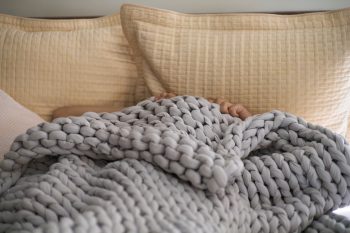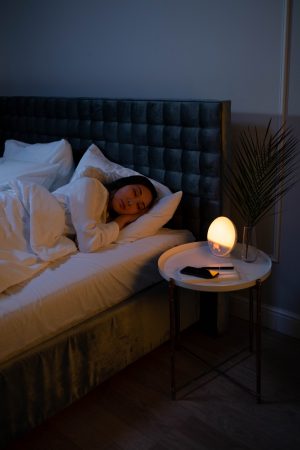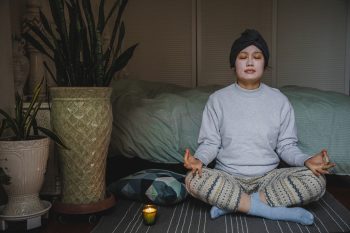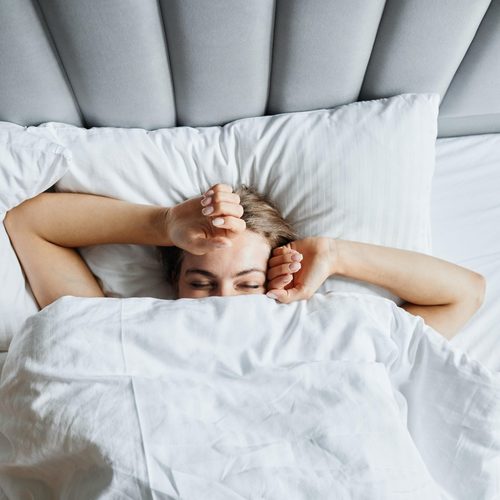Sleep plays a massive role in keeping healthy. When you don’t get enough of it, your mind and body drag behind. Many factors can influence how deeply you catch those zzz’s, such as poor lighting, staring at a screen before bed, and battling with a restless mind.
Personally, the quest to better my sleep is one that I’ve been on for years and I’ve picked up a few helpful tidbits along the way. The key? It’s all in the way you set up your bedroom for better sleep!
Let’s look at some of the ways you can do this:
It starts with your bedding
Having comfortable bedding that supports your sleep is so important!
When it comes to pillows, you need one that properly supports your spine. You don’t want something that’s too puffy, bending your neck away from the alignment of your spine. You also don’t want an overly flat pillow, which can also cause misalignment which then leads to issues like neck and shoulder pain.
If you’re looking for the cream of the crop, I’d suggest getting yourself an orthopaedic memory foam pillow designed to support your spine.

Getty
Another important thing is temperature regulation! In the winter, bust out your cosiest duvet, and in the hotter months, your bedding should be light and airy. Most homeware stores stock duvet sets for both winter and summer. It’s useful to have two sets of each. If you tend to get anxious or restless before bed, you could also invest in a gravity blanket, designed to make you feel swaddled and safe.

Getty
Don’t underestimate low-lighting
Don’t keep your bedroom light on right up until you fall asleep! Poor lighting can contribute towards poor sleep. It’s important to let your eyes adjust to the natural light, even at night. Less light signals the brain it’s time to wind down and get ready for bed. Bright light does the opposite. Go for low, warm lighting with a bedside lamp, candles or even string lights.

Pexels
Having a TV in the bedroom has its perks, but it can also affect your sleep. I like to stay away from all screens at least an hour before bed. Having a TV blaring and lights from the screen flickering over you is not the recipe for deep sleep. I like to indulge in a movie before bed on the weekends but on weekdays, I keep the screens off and the lighting as low as possible.

Getty
Early morning sun peeking through the curtains is enough to signal your brain that it’s time to wake up again. If you value those few hours of sleep in the mornings, I’d recommend getting black-out curtains, which are fantastic for shutting out light in daytime. These are also great if you work later shifts and sleep in the day, or just enjoy napping.
Set the mood for sleep
Don’t neglect to set the mood for sleep. Personally, I treat myself like a princess before bed. Having a proper routine in place is a great way to signal your mind that it’s time to rest now, especially if you involve a bit of pamper.

Getty
Before climbing into bed, I pour myself a glass of water for the night and set it on my nightstand along with a lavender roller and a cosy pair of socks. By this time, all screens and lights are off and my Fragonard candle burns. I love using a lavender roller gently on my temples before I sleep, which works its aromatherapy magic as I doze off like a baby.
Another bedtime ritual that I covet is enjoying a warm cup of chamomile tea with a spoonful of honey. Usually my partner will brew me a cup as I climb out of the shower and get ready for bed. By the time I’m applying my lavender, I’m ready to clock out.

Getty
Of course, cosy time rituals are personal to everyone. The most important thing is to make sure you’re setting up the scene for sleep, doing things that are gentle and restful rather than engaging in something that requires brainpower, or lots of movement.
I hope this helps you improve your sleep!
ALSO SEE:
Sleep like you’re in a luxury hotel bed every night, with white bedding
Feature Image: Getty

